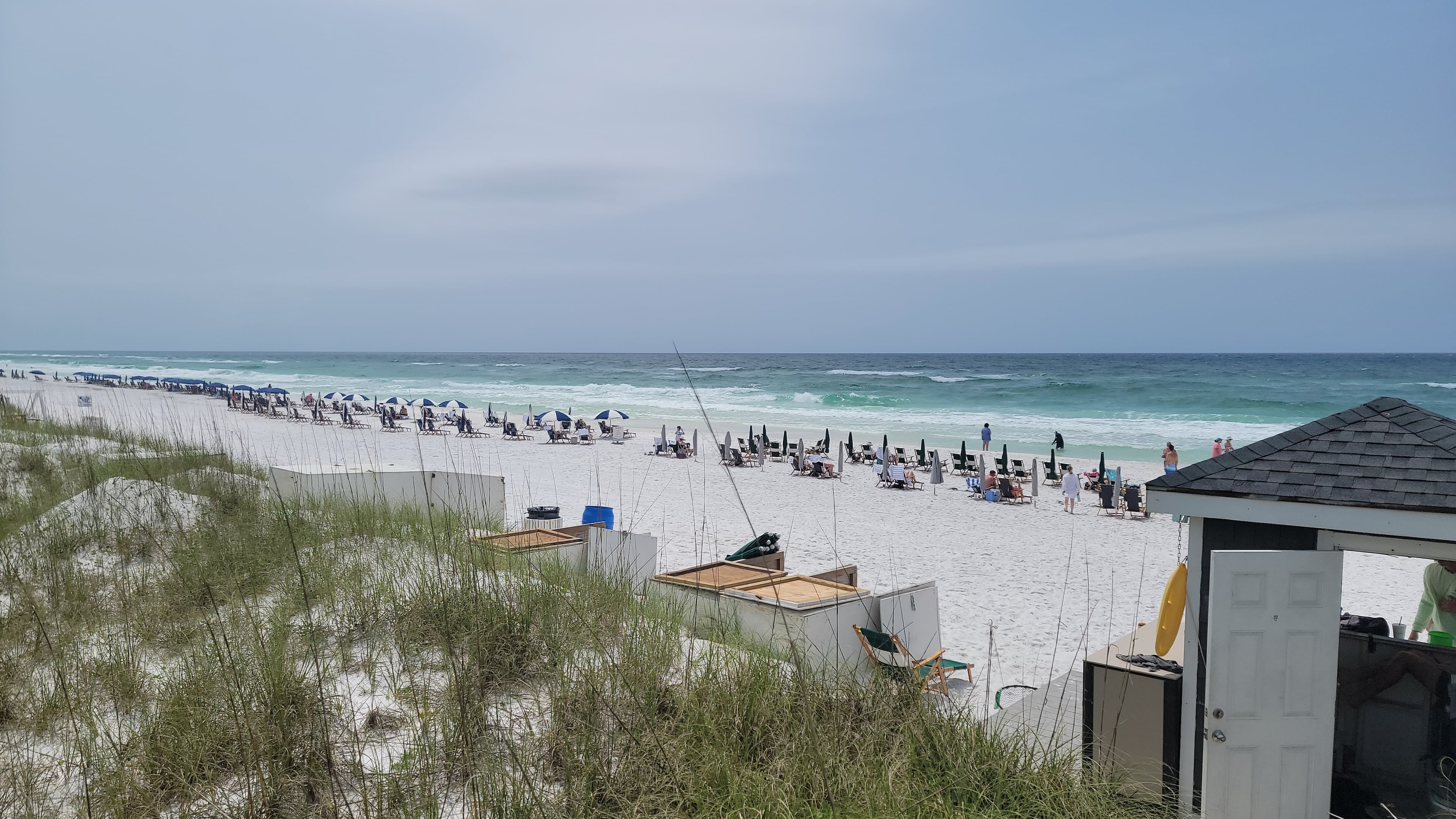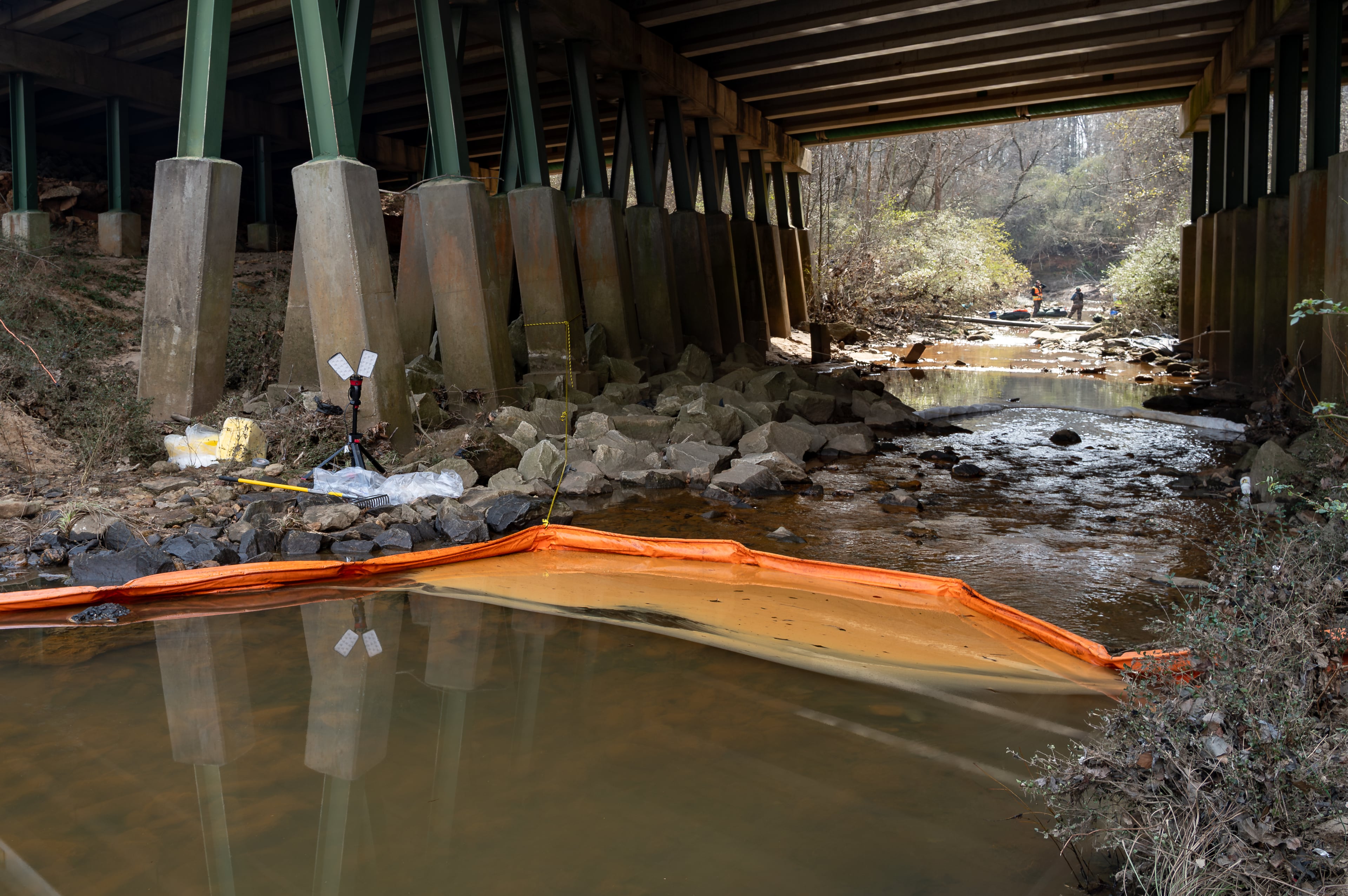Destin’s artificial reef program hopes to keep anglers hooked

Feeling pretty satisfied with myself, I baited my hook aboard the American Spirit, a large fishing charter based in Destin, Florida. I had stopped asking my husband to put the malodorous, icky bits of chum on the hook and was doing it myself like the experienced deep-sea angler I wanted to become. I cast my line, and within minutes, a tug that nearly bent my rod in half had me scrambling to reel in my trophy. It was gonna be a big one!
What? Nothing. I did this several times — casting my line and reeling it in after feeling a pull, and finally realized I was just feeding the dolphins.
Maybe it was just my bait the fish found unpalatable, because others on the charter were reeling in large triggerfish, grouper and red snapper.
Fish or no fish, I was content to sail on the brilliant green waters of the Gulf of Mexico with the sun on my face. There’s a reason this stretch of the Panhandle is called the Emerald Coast.
In the end, I did catch a couple of small fish. Between my husband and me, we had enough for a hearty lunch.

Back at the dock, everybody in our large group was given the fish they caught and herded over to AJ’s Seafood and Oyster Bar where it would be fried and served with hushpuppies or fries.
Catch and cook fishing trips like this are something many visitors to the Florida Panhandle take for granted, but without Okaloosa County’s extensive artificial reef program, they may not be possible.
Destin has the largest fleet of charter boats working out of one port in North America, and marine resources are not infinite. There could come a day when the fish stop biting, and not because dolphins are stealing the bait.
Alex Fogg, Okaloosa County’s coastal resource manager, said man-made marine habitats, aka artificial reefs, are one solution to the many challenges the Gulf is facing.

“With more and more fishers venturing offshore with better technology, we need to think outside the box to ensure the industry that is our lifeblood isn’t negatively impacting our environment and resulting in overfishing,” Fogg said. “Artificial reefs help increase our capacity by diversifying essential fish habitat but also produces more fish.”
Many of the artificial reef programs are funded by compensation from the BP Deepwater Horizon oil spill in 2010, the worst offshore oil spill in U.S. history that threatened Destin’s flora and fauna as well as its tourism-based economy.
The first ever 3D printed artificial reefs deployed off the coast of Destin-Fort Walton Beach last February was one such project. Twenty-five concrete modules were sunk 60 to 90 feet to the Gulf floor where they will soon be covered with algae, barnacles and other sea life that attract fish.
The concept of artificial reefs isn’t new to the area. Over the years, hundreds of man-made reefs have been formed by sinking decommissioned military equipment, a tugboat, an old Mississippi paddle wheeler and much more. Before deployment, vessels undergo a rigorous cleaning to ensure that oil, plastics and other environmentally harmful materials are removed.
Once the sea life moves in, so do the divers. Immersing yourself in this silent aquatic realm is an escape from the demands of the modern world. Nobody can reach you down there except the occasional sea turtle or manta ray gliding alongside you as you admire fish in a kaleidoscope of colors.

Adventurous anglers can ditch their rods for spears and hunt lionfish. These venomous invaders native to the Indo-Pacific started showing up off the coast of South Florida in the ‘80s and have spread far and wide, harming the delicate balance of Florida’s marine ecosystem. Voracious creatures that breed at an astonishing rate, they prey on native fish, in some cases decimating populations by 80% to 90% in a matter of weeks.
A row of venomous spines along their back protects them from predators. Lionfish hunters should enroll in a training course at a local scuba diving company to learn how to safely harvest these fish. And they taste delicious. Seafood lovers compare the white, flaky meat to mahi mahi.
Fogg says when it comes to controlling the lionfish population, Destin has taken lemons and made lemonade.
“There’s no doubt lionfish have impacted the ecosystems they have invaded,” Fogg said. “Fortunately, we have taken this problem and found a solution that not only benefits the invaded ecosystems but also the local economy by creating a novel seafood and tourism product.”
That solution comes in the form of the annual Emerald Coast Open Lionfish Tournament in May. Thousands of the nuisance fish are eliminated during the two-day festival. But lionfish can be fished year-round.

The fishing industry is always evolving. To get a historical perspective, visit the Destin History and Fishing Museum, which traces the town’s trajectory from a tiny fishing hamlet to a world-renowned tourist destination.
The first commercial fishing in Destin began in 1835 with seine net fishing, an ancient method that uses a large net hung vertically in the water to surround schools of fish. On view is the historic Primrose, the last seine fishing boat built in Destin.
Another point of interest is the exhibit on the Destin Fishing Rodeo, one of the longest running fishing tournaments in the country held the entire month of October. It started in May 1948 but was moved to October to extend the tourist season.
Locals still hang out at the docks at the end of the day to see proud anglers hit the scales with their catch.
The recent history of Florida’s artificial reefs and their construction is documented, illustrating some major blunders in the nascent stages of the concept.
In the 1970s, an estimated 2 million scrap car tires were dumped into the Atlantic off the coast of Fort Lauderdale with the intention of expanding fishing capacity. Over time, the toxic materials broke down, creating an environmental disaster and an underwater junk yard that was an eyesore for divers. A cleanup has been underway for years.
Fortunately, the science behind man-made reefs has come a long way since the ‘70s, and now teams of experts carefully consider the inherent environmental compatibility of any materials deployed to the seafloor.
One thing is certain. Without artificial reefs in Destin waters, the “one that got away” could be an entire marine ecosystem.
IF YOU GO
Destin, Florida
Destin is a 5.5-hour drive southwest from Atlanta via I-85 S, to U.S. 331 S, to U.S. 431 S. Direct flights from Hartsfield-Jackson Atlanta International Airport to Destin-Fort Walton Beach Airport are one hour.
What to do
American Spirit. Deep-sea fishing charter. A six-hour excursion is $95 for adults and $47.50 for children. 116 Harbor Blvd., Destin, Florida. 850-837-1293, destinfloridadeepseafishing.com
Shark Quest Dive Shop. Offers diving and spear fishing charters. $155-$250. 5614 Gulf Breeze Parkway, Gulf Breeze, Florida. 850-516-6800, www.scuba-dive-pensacola.com
Destin History and Fishing Museum. $10. 108 Stahlman Ave., Destin, Florida. 850-837-6611, destinhistoryandfishingmuseum.org
Where to eat
AJ’s Seafood and Oyster Bar. Casual waterfront seafood restaurant. Entrées $18-$50. 116 Harbor Blvd., Destin, Florida. 850-837-1913, ajsdestin.com
Crab Trap Destin. Family-friendly seafood restaurant with a beachfront playground. Entrées $32.99-$139.99. 3500 Scenic Highway 98, Destin, Florida. 850-654-2722, crabtrapflorida.com
Where to stay
Henderson Beach Resort & Spa. Short drive to many tourist attractions. $449-$499. 200 Henderson Resort Way, Destin, Florida. 855-741-2777 hendersonbeachresort.com
Emerald Grande at HarborWalk Village. Vacation rentals in the heart of the entertainment district. $245-$572. 10 Harbor Blvd., Destin, Florida, 850-337-8100, emeraldgrande.com
Tourism Info
Destin-Fort Walton Beach Welcome and Adventure Center. 1540 Miracle Strip Parkway SE, Fort Walton Beach, Florida. 800-322-3319, destinfwb.com

